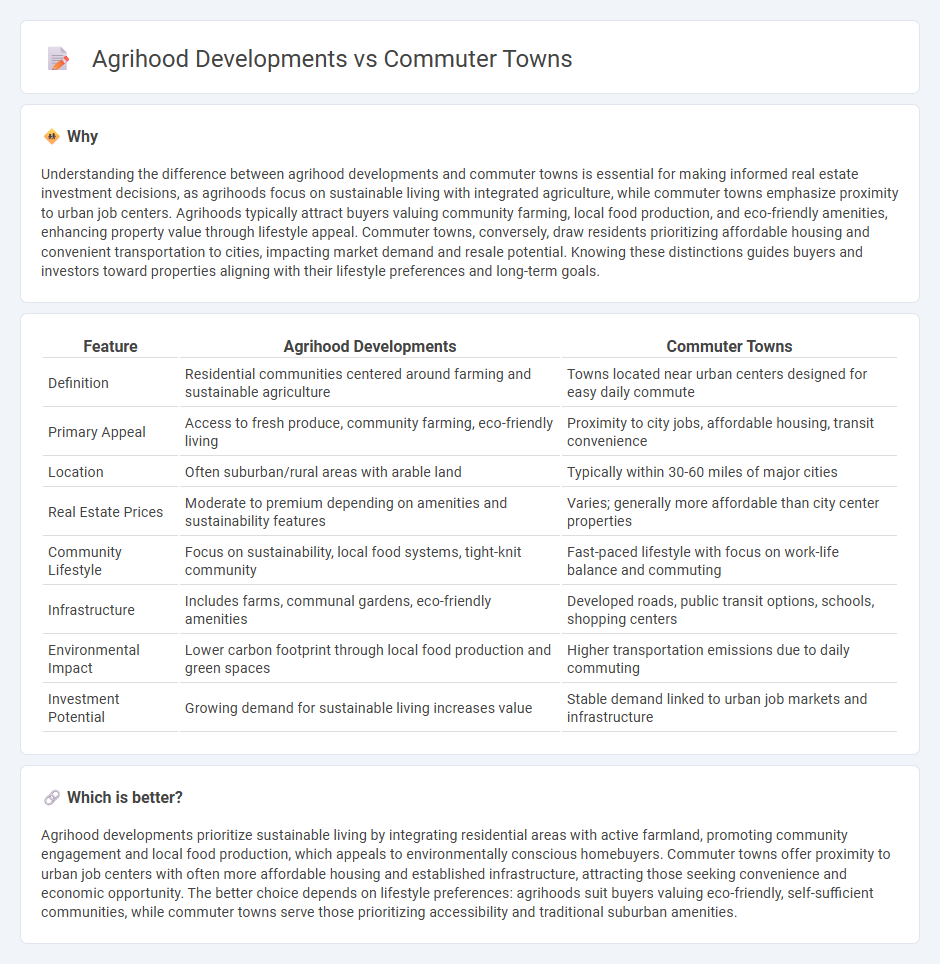
Agrihood developments integrate sustainable agriculture with residential living, offering eco-friendly environments and fresh local produce, whereas commuter towns primarily focus on housing affordability and proximity to urban job centers. Agrihoods emphasize community engagement and environmental stewardship, attracting residents seeking a lifestyle connected to nature, while commuter towns cater to convenience and transportation access. Explore the advantages and lifestyle impacts of agrihood developments versus commuter towns to determine the best fit for your real estate preferences.
Why it is important
Understanding the difference between agrihood developments and commuter towns is essential for making informed real estate investment decisions, as agrihoods focus on sustainable living with integrated agriculture, while commuter towns emphasize proximity to urban job centers. Agrihoods typically attract buyers valuing community farming, local food production, and eco-friendly amenities, enhancing property value through lifestyle appeal. Commuter towns, conversely, draw residents prioritizing affordable housing and convenient transportation to cities, impacting market demand and resale potential. Knowing these distinctions guides buyers and investors toward properties aligning with their lifestyle preferences and long-term goals.
Comparison Table
| Feature | Agrihood Developments | Commuter Towns |
|---|---|---|
| Definition | Residential communities centered around farming and sustainable agriculture | Towns located near urban centers designed for easy daily commute |
| Primary Appeal | Access to fresh produce, community farming, eco-friendly living | Proximity to city jobs, affordable housing, transit convenience |
| Location | Often suburban/rural areas with arable land | Typically within 30-60 miles of major cities |
| Real Estate Prices | Moderate to premium depending on amenities and sustainability features | Varies; generally more affordable than city center properties |
| Community Lifestyle | Focus on sustainability, local food systems, tight-knit community | Fast-paced lifestyle with focus on work-life balance and commuting |
| Infrastructure | Includes farms, communal gardens, eco-friendly amenities | Developed roads, public transit options, schools, shopping centers |
| Environmental Impact | Lower carbon footprint through local food production and green spaces | Higher transportation emissions due to daily commuting |
| Investment Potential | Growing demand for sustainable living increases value | Stable demand linked to urban job markets and infrastructure |
Which is better?
Agrihood developments prioritize sustainable living by integrating residential areas with active farmland, promoting community engagement and local food production, which appeals to environmentally conscious homebuyers. Commuter towns offer proximity to urban job centers with often more affordable housing and established infrastructure, attracting those seeking convenience and economic opportunity. The better choice depends on lifestyle preferences: agrihoods suit buyers valuing eco-friendly, self-sufficient communities, while commuter towns serve those prioritizing accessibility and traditional suburban amenities.
Connection
Agrihood developments integrate agricultural spaces within residential communities, appealing to homebuyers looking for sustainable living and fresh produce access, which often attracts commuters seeking a balance between rural tranquility and urban job centers. Commuter towns benefit from nearby agrihoods by offering residents lifestyle amenities that enhance quality of life without sacrificing proximity to metropolitan areas. This synergy drives demand in real estate markets, increasing property values and encouraging mixed-use development that supports both local agriculture and commuter infrastructure.
Key Terms
Zoning
Zoning regulations distinguish commuter towns, primarily residential areas with mixed-use zones for convenience, from agrihood developments that integrate agricultural zones with residential living, promoting sustainable land use. Commuter towns often have zoning policies supporting transportation infrastructure and commercial centers, whereas agrihoods emphasize preserving farmland and community gardens. Explore how zoning shapes the future of sustainable suburban living and agricultural integration.
Land Use
Commuter towns primarily focus on residential land use designed to house individuals who travel to urban centers for work, often resulting in large suburban neighborhoods with limited local employment or agriculture. Agrihood developments integrate residential living with active agricultural land, promoting sustainable farming, community gardens, and green spaces that enhance both food production and ecosystem services. Explore the distinctive land use strategies and community benefits each model offers to better understand their impact on urban planning.
Infrastructure
Commuter towns emphasize transportation infrastructure with extensive road networks and rail connections to urban centers, facilitating daily travel for residents. Agrihood developments prioritize sustainable water management systems, integrated green spaces, and pedestrian-friendly pathways to support local agriculture and community living. Explore more about how infrastructure shapes these distinct living environments.
Source and External Links
Top NYC Commuter Towns - This article lists popular commuter towns near NYC, including Jersey City, Stamford, and Greenwich, which offer lower rent and convenient commutes to the city.
The Best Commuter Towns To NYC (2025) - This guide highlights commuter towns like Weehawken, Tarrytown, and Kings Point, emphasizing their proximity and travel options to NYC.
The Long Island Commuter's Guide - This guide provides information on Long Island towns like Garden City and Rockville Centre, focusing on their express train services and commute times to NYC.
 dowidth.com
dowidth.com